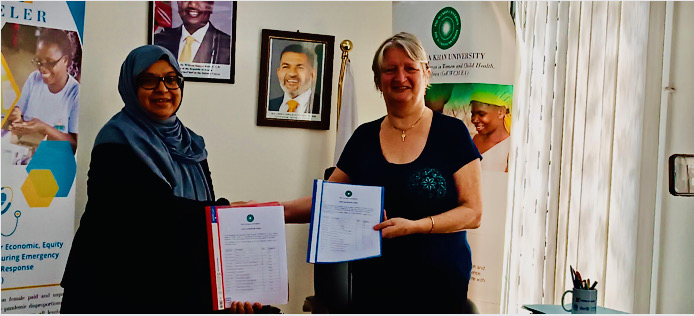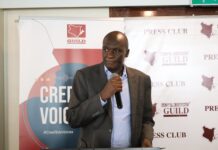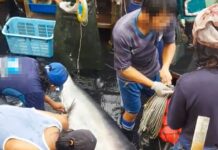
By Jane Meza
Mombasa County, Kenya: Mombasa County Department of Health Services has received donations of desktops, conference speakers, webcams, television sets, internet connectivity, and backup systems valued at approximately KES 600,000 (6,000 USD) with the support from the Aga Khan University Centre of Excellence in Women and Child Health, East Africa (CoEWCH EA).
The supplies were a donation courtesy of the Women in Health and their Economic, Equity, and Livelihood statuses during the Emergency Preparedness and Response (WHEELER) project with funding from the Canadian International Development Research Centre (IDRC).
The project is a collaboration between CoEWCH, EA, the University of Manitoba, and Kilifi and Mombasa counties.
Speaking at the Mombasa County’s Department of Health Services office recently, Prof Marleen Temmerman, Director of CoEWCH EA obstitutional gynecologist, and public health expert at Aga Khan University said the materials will be used for the setting up of two e-Resource centers in Mombasa County.
“Most of our work is in Mombasa and Kilifi counties but we also want to work with all six counties in the coast region, we have three principals investigated in Kenya and we are building this project together the aim of this project is to implement the mitigation measures of Covid -19 pandemic,” said Ms. Temmerman.
Ms. Marleen said, it will be used to remotely connect the research team with both healthcare workers and community health promoters during the study and beyond.
“We are in the health sector and this program is looking at whether is there a different between female and male health care workers not in a relationship with the disease but in the relationship to the economic live hood, their career because women and men health worker suffered differently from Covid pandemic and all the mitigation measures because we want to know and want to collect its data in Mombasa and Kilifi,” she added.
The e-Resource centers will facilitate capacity building of healthcare workers and community health promoters on research methods, gender-related studies, and other clinical courses delivered by the Aga Khan University and the University of Manitoba.
By creating these centers, the study will have facilitated the diffusion of knowledge to healthcare workers who may not necessarily participate in on-site training.
“The equipment will make it easier for the teams to communicate and conduct the training from wherever they are as opposed to going to each site, it will save on time and money connecting everyone and facilitating the research,” said Prof Marleen Temmerman.
The WHEELER study aims to provide evidence on the effects and possible impact of work-related health and safety changes and the disruption to female paid and unpaid healthcare providers (HCPs) economic opportunities and livelihood during the COVID-19 pandemic.

This will be achieved by comparing how both male and female HCPs were affected to see if there were any differences in the impact.
However, the study will use participatory and gender-based analysis approaches in generating the evidence to formulate gender-inclusive and transformative strategies that will safeguard the female HCPs in the current pandemic and during emergency preparedness, response, and recovery phases in future health crises.
Mombasa’s County Executive for the Department of Health Services, Dr. Swabah Ahmed commended the initiative by noting the importance of research in preparing for future emergencies.
“The idea is to come up with the evidence-based decision that will form policy and what we are looking at is during the Covid pandemic there were so many disparities not only unique to Kenya but all over the world and many studies have exposed these disparities either due to race, age, gender, and many others,” explained Dr. Swabah.
While extending support to the project, she encouraged the incorporation of capacity building to enhance research efforts and meet research needs in Mombasa County.
“What we are looking at with our partner is to look at dissimilarities and similarities used as the evidence to provide into the study how our health care provider benefited in terms of services they provide the unpaid and paid both men and women and look at how going forward will able be resilience system to overcome these disparities,” said Dr. Swabah.
“We will closely follow the research to ensure that we curb the limitations the study might face, there also is readily available data that the study can use. I hope that this project will mentor others in research and look forward to future collaborations in health research with the Aga Khan University and Centre of Excellence in Women and Child Health, East Africa,” she said.
The WHEELER study, in line with CoEWCH EA’s mandate, is keen on building research capacity for young leaders. The project will mentor a master’s student from the Technical University of Mombasa to fulfill this objective.
The findings from the study will advise policy formulation to the two county governments of Kilifi and Mombasa that is specific and gender-responsive with the purpose of mitigating the negative effects that may result from emergencies such that livelihoods are not greatly disrupted.
The team belief is that through this study they will be able to strengthen the research capacity within the public health system in addition to supporting the health system in the generation of evidence-based gender-responsive policy options for safeguarding the health care workforce across all levels during periods of crises.













